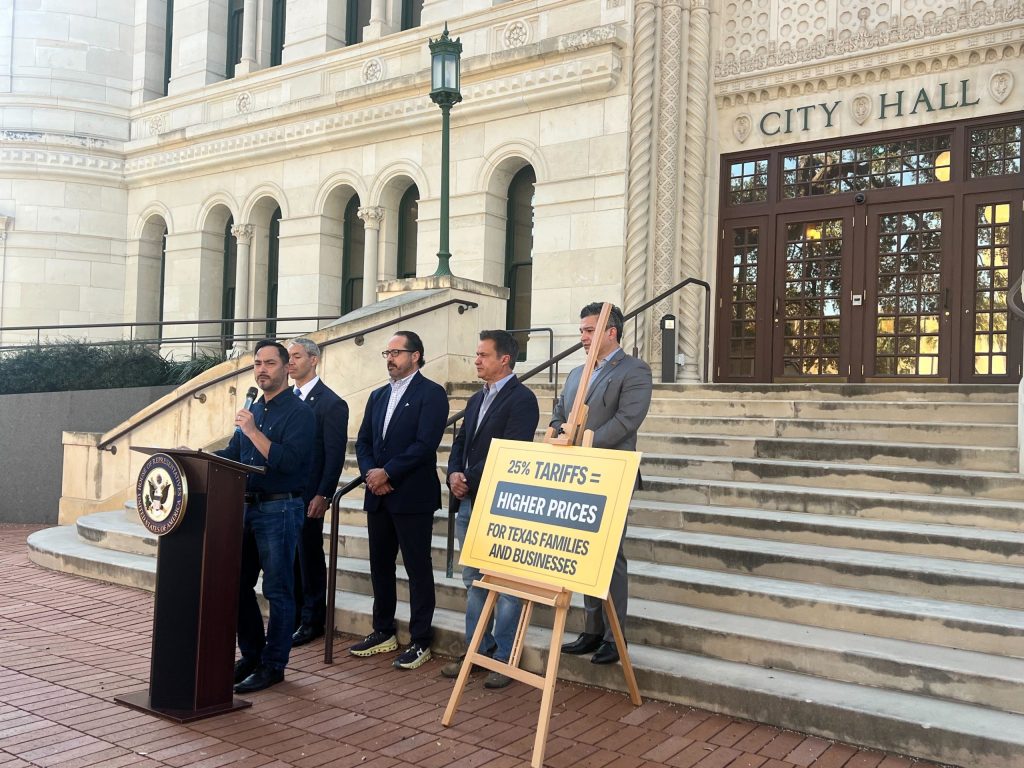San Antonio residents may start to feel the effects of tariffs on foreign imports imposed by President Donald Trump local leaders and economists cautioned on Monday on the steps of city hall.
What does that mean? Well, avocados could cost you more than usual.
On Saturday, Trump signed an executive order to impose a 25% tariff on imports from Canada and Mexico, and a 10% tariff on Chinese goods, sparking concern among global trade leaders. While a 30-day delay on tariffs for Mexico and Canada was also announced Monday, San Antonio leaders expressed lingering unease during an emergency press conference.
“These tariffs are attacks on the American people, a penalty that hard-working Texans will pay every single day, every time they buy groceries, fill up tanks of gas, or shop at local businesses,” said U.S. Rep. Joaquin Castro (D-Texas).
The congressman pointed out that Mexico is Texas and San Antonio’s top trading partner, and Canada and China also contribute significantly to the local economy.
U.S. economists estimate these tariffs could cost the average American up to $1,200 more per year in general expenses.
Castro also emphasized that San Antonio is home to many people who already live on the margins or struggle to make ends meet. According to the city’s latest Status of Poverty Report, nearly half of San Antonians either struggle to cover basic expenses or are one financial emergency away from being unable to afford necessities.
Mayor Ron Nirenberg said if Trump does implement tariffs on Mexico, San Antonio could be hit especially hard. According to the Observatory of Economic Complexity, San Antonio businesses import roughly $207,000 worth of goods every 30 days, with Mexico accounting for over 60% of trade exports and nearly 57% of imports.
“Simply put, San Antonio small businesses, manufacturers, and, most importantly, our working residents can’t afford Donald Trump’s tariffs,” Nirenberg said. “We are urging this administration to end its assault on the American working class and consider permanently extending the delay on these damaging tariffs.”
Texas senators José Menéndez and Roland Gutierrez, both Democrats, also expressed opposition to the tariffs during the press conference. Menéndez highlighted that car manufacturers — like Toyota, which has a facility in south San Antonio — would also be impacted, potentially raising the cost of vehicles by up to $3,000.
Gutierrez described many of Trump’s new policies, including the new tariffs, as “the most blatant racist attack on the Hispanic people that we’ve seen by any president in at least 100 years.”
A tariff is a tax imposed by a government on imported goods or services, designed to protect domestic industries by making foreign products more expensive or to generate revenue for the government.
However, tariffs could lead to trade tensions between countries.
The impacts of the tariffs could be felt quickly, Castro warned, noting that he’s been in discussions with local business owners and companies, although he declined to specify which ones. The San Antonio Report did not receive a response from H-E-B by the time of publication regarding whether the Texas grocery chain would be directly impacted by the tariffs.
“I think we’re going to start to feel even more economic pain at a time when people’s budgets are already stretched thin,” Castro said.
Tom Tunstall, senior research director for UTSA’s Institute for Economic Development, offered a more cautious view, suggesting that the impacts may not be immediate.
Tunstall urged residents to be patient, noting that it appears some of Trump’s tariff actions could be used as bargaining tools, meaning they might never take effect.
If the tariffs do go into effect, Tunstall explained that different countries might respond in varying ways, with sellers sometimes absorbing some of the costs temporarily.
“But sooner or later, it ultimately means higher prices for the country that imposes the tariffs,” he said. “One of the strategic reasons for doing that, aside from the punitive aspects, is to encourage production in the U.S.”
In the short term, the tariffs would likely result in higher prices for consumers.
However, Tunstall suggested they could also incentivize companies to eventually bring manufacturing or other industries back to the U.S.








